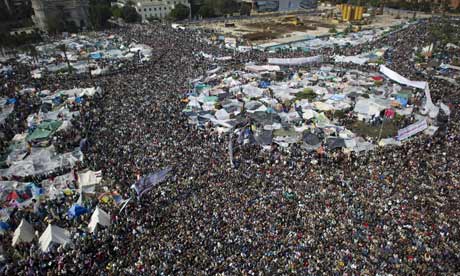Like millions of people around the world, I’m deeply inspired by the great victory that was won by the Egyptian people today, and deeply humbled by their magnificent power. Eighteen days, without a moment of respite, spent in the streets (not to mention the years of struggle by human rights and democracy activists against the regime that helped lay the groundwork for the latest protests) has made the impossible come true. “Look at the streets of Egypt tonight; this is what hope looks like,” as Ahdaf Soueif wrote a few hours ago.
Bassam Haddad says what many of us are feeling: “The implications are grand, for Egypt, and beyond. But the jubilation at this moment must be reserved for Egyptians who struggled for decades and brought the symbol of the Egyptian regime down in a matter of 18 days of protests around clock and country.”
“Analysis” seems less than appropriate at this particular moment, although it will be more than necessary in the days to come. Instead, as part of this moment of hope, perhaps a brief and subjective review of just a few of the seeming impossibilities that have come to pass in the past few days might be in order:
The possibility that Midan Tahrir could look like this:

The possibility of witnessing celebrations on the streets of Gaza City, and with them the hope that the Egyptian enabling of the siege of Gaza may be coming to an end.
The possibility that Egyptian state television, bowing to the inevitable, would begin simply showing al-Jazeera’s live feed — when, just days ago, the regime had banned al-Jazeera’s Arabic and English language channels from broadcasting, revoked the press credentials of all of its journalists, detained at least nine of its correspondents, and attacked the channel’s Cairo offices.
For that matter, the possibility that a popular movement could sprout in the U.S. demanding that cable operators here carry al-Jazeera English.
The possibility that regimes in the region would be driven to such lengths in their attempts to anticipate and counteract popular movements, ranging from the ominous (the deployment of thousands of police in Algiers ahead of the “Day of Rage” that has been called for February 12) to the absurd (see, for example, this tweet from the Guardian’s Julian Borger: “Reports say Bahrain`s King Hamad has offered a grant of $2600 to every family ahead of Bahrain`s day of rage due on Monday. Panic spreads.”).
The possibility that Tehran (where the BBC’s Persian service was blocked earlier today, thanks to its coverage of events in Egypt) and Tel Aviv (where Mubarak found a sympathetic ear during his final moments in power) would find themselves so united in their response, as fear of the results of a democratic movement in Egypt produced a remarkably similar sense of trepidation in the respective regimes of Iran and Israel.
The possibility that Anderson Cooper would begin his broadcast, as he did this evening, by wishing the Egyptian people “good morning” in Arabic.
The possibility that even Lindsay Lohan would be moved to pledge her support to the Egyptian people — provided, of course, that “Egypt maintains it`s [sic] treaty with Israel.”
And, of course, the possibility that the sheer delight of clicking on ismubarakstillpresident.com could even exist.
I’ve been writing for a long time about the work of the great revolutionary theorist Frantz Fanon. The last thing I want to do, at this moment, is offer some sort of “Fanonian analysis” of the Egyptian revolution. But one line of Fanon’s, from Les damnés de la terre (The Wretched of the Earth), popped into my mind as I was trying to process the fast-moving events of the past eighteen days. It’s a moment marked by Fanon’s trademark irony, but it also partakes of some of the fearless jubilation of the present moment:
Now they say the colonized want to move too fast. Let us never forget that it was only yesterday the colonized were accused of being too slow, too lazy, and too fatalistic.
Adapting Fanon to the current moment, we might re-translate him this way: Today they say that the Egyptian people want to move too fast towards true democracy. Let us never forget that it was only yesterday Egyptians were accused of being too slow, too lazy, and too fatalistic for true democracy.
This racist truism, this remnant of colonialism and Orientalism — the myth of “Arab fatalism,” “Arab passivity,” “Arab backwardness” as explanation for autocratic regimes like those now ousted by the people of Tunisia and Egypt — has now been burned to the ground; its remains lie next to the ashes of the NDP headquarters in Cairo, and it has been laid to rest equally effectively alongside the shuttered offices of the CDR in Tunisia.
In bringing the impossible to pass, the Egyptian people have moved faster than many of us dreamed possible. In the weeks to come, after the euphoria passes, there will be calls for them to slow down. Our job is precisely the opposite: to do our best to keep up.